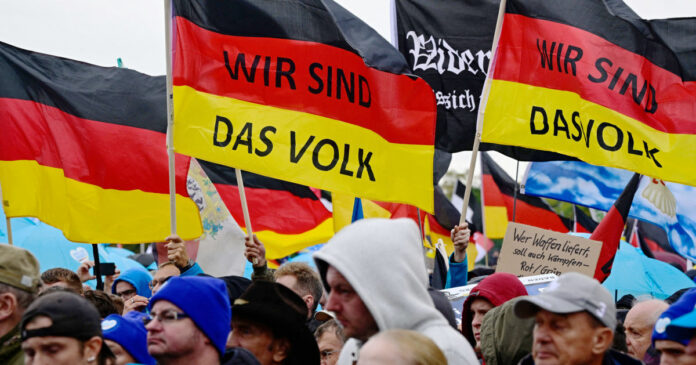MAINZ, Germany — Germany’s security services are stepping up efforts to monitor and contain the threat from modern far-right extremists amid a rise in politically motivated hate crimes.
Earlier this week, the country’s domestic intelligence service branded the youth wing of the country’s biggest far-right party a dangerous extremist group.
The seriousness with which the authorities are taking the issue has increased dramatically in recent years, according to Kai Arzheimer, a professor of politics at the University of Mainz in Germany, who studies far-right extremism.
“Politicians and the security apparatus have underestimated or downplayed the scale of the problem for decades. Thankfully, this began to change even under the last administration,” he said.
Multiple criminal investigations are ongoing into a small but potentially dangerous group of far-right Reichsbürger extremists who allegedly plotted to overthrow the government and install an obscure hereditary prince, inspired by a florid mixture of right-wing conspiracy theories.
The country’s domestic intelligence service, the Federal Office for the Protection of the Constitution (known by the German abbreviation BfV), has designated the youth wing of the the Alternative for Germany, or AfD, as extremist.
A decade after it was founded as a more conventional party critical of the European Union and integration, the far-right AfD is now firmly a part of the Germany political landscape. An opinion poll from German public broadcaster ZDF on Friday gave it 17% of the national vote — enough to become the third-strongest party in the country.
German far-right extremism experts tell NBC News that the rise of the far-right is real and dangerous, with ex-military servicemen and active police officers with access to guns allegedly involved in a conspiratorial plot, while the popularity of the AfD has reshaped political thought and dragged centrist parties to the right.
The AfD party rose to prominence around the time of the 2015 refugee crisis when then-Chancellor Angela Merkel invited hundreds of thousands of migrants, most fleeing the civil war in Syria, to settle in Germany. More than a million came, leading to anti-immigrant sentiment across Germany and Europe.
Its youth wing, the Young Alternative for Germany (known via the German abbreviation JA), which has members as young as 14, is the first German group to be branded as extremist since the Nazi era, its members described as “arsonists and cue-givers of hate” by BfV President Thomas Haldenwang this week. The AfD as a whole was put under official surveillance by domestic intelligence service in 2021.
The AfD may choose to fight the extremism decision in court and despite its “well-documented” links to even more radical far-right activity, it still has enough support nationally to be considered by some as a mainstream, respectable party, Arzheimer said.
“The AfD is the strongest party in some regions in the east and commands very respectable levels of support nationally. Their sizable delegations in the Bundestag, European Parliament, and most state parliaments give them legal protection but also access to funds and the media so that their position is quite entrenched.”
In the former East Germany, which reunified with the West in 1991, it enjoys the support of roughly a quarter of voters, making it frequently the strongest party in eastern regions.
Ahead of the 2021 federal elections in Germany, the Bertelsmann Foundation found in a survey that just under 8% of German voters had “manifest right-wing extremist attitudes.” The figure is almost four times higher among AfD supporters.

The AfD denies that it fosters extremist views.
Neither the AfD nor the Young Alternative responded to NBC News’ requests for comment. But in a statement posted to the party’s website Wednesday, co-leaders Tino Chrupalla and Alice Weidel said: “There is no progressive radicalization in the AfD,” adding that the BfV’s decision to class the youth wing as extremist was an “outrageous action.”
The rise of the right is felt across society.
Of the almost 60,000 politically motivated crimes recorded by German police last year — including antisemitic crimes and those targeting asylum-seekers — 41% were committed by far-right extremists. The number of recorded hate crimes rose by 10% compared to 2021 and three quarters were inspired by far-right ideology, officials said earlier this month.
Unveiling the figures, Interior Minister Nancy Faeser said she would be urgently proposing new, tighter gun laws as a result.
And 79% of people asked by the German Center for Integration and Migration Research, a state-backed think tank, said German democracy was in more danger today than it had been five years ago.
On Tuesday, Germany’s federal prosecutor’s office said it had detained three more suspected far-right anti-democracy extremists linked to an alleged plot by the Reichsburger — or citizens of the Reich — movement, which is accused of an alleged plot to overthrow the government.
The three are suspected of membership in a terrorist organization, the prosecutor’s office said in a statement. In December, 25 people from the group were arrested in an operation involving 3,000 officers who recovered firearms, bullets and detailed plans.
While few believe the group could achieve its goal, experts say it is dangerous.
“There was a high likelihood of loss of life. With more and more of these groups, we see that they are members of the military or are ex-military or ex-police,” said Miro Dittrich, an expert at CeMAS, a German group that monitors right-wing extremism.
As with much far-right across Europe, another catalyst for the movement was resistance to pandemic restrictions and lockdowns.
“A lot of people joined this movement and they said people would rise up, but it never led to anything,” Dittrich said.
“So the inner core of the group believe there is a plan, a conspiracy to terminate Germans and it is war and it’s legitimate to use violence in a crisis moment.”
There is a more subtle but no less important aspect to the rise of Germany’s far right: a rightward drift in the language and politics of mainstream parties, according to Vicente Valentim, a political scientist at the University of Oxford in England who studies how politics changes social norms.
“So a part of this increase is not people becoming more extremist, it’s that people who already had these views are more likely to talk about them in public. It gives voters a cue that there are others who share their views, that they are acceptable,” he said.
There had also been a concrete shift in voting trends and attitudes in the last 10 years, Valentin OR Valentim argued, but just as significant was the emboldening of those who were already anti-migration and worried about radical Islam — and the center right has changed accordingly.
“It also has affected how other politicians speak — the center right takes on some of the rhetoric of the far right. It’s a very strong mechanism for changing social norms. We have quite a lot of evidence that once the far right became successful, the remaining parties got closer to their views on migration,” he said.
Andy Eckardt reported from Mainz, and Patrick Smith reported from London.


